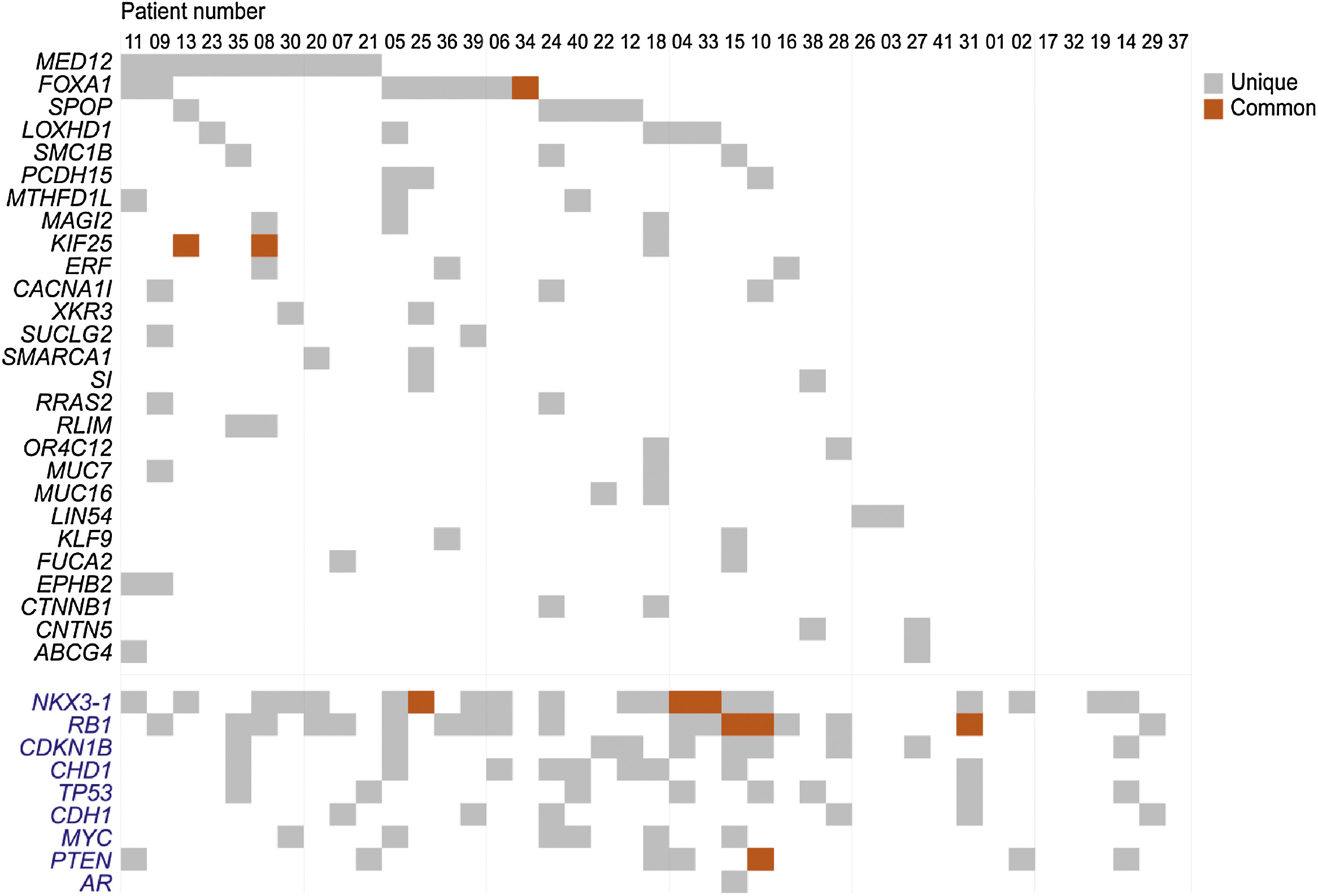Interfocal heterogeneity of prostate cancer
Prostate cancer is the most common type of cancer, presents a significant need for prognostic biomarkers. Research has revealed that the presence of multiple tumor foci with distinct molecular characteristics complicates the development of such biomarkers, particularly if this inter-focal heterogeneity is not taken into account.

By utilizing a multifocality-oriented biobank, the research group has discovered that individual tumour foci from the same patient have completely separate sets of somatic mutations (Løvf et al., 2019) and gene expression patterns (Strømme et al., 2022). Furthermore, the expression of biomarkers shows similar inter-focal heterogeneity (Kidd et al., 2021), challenging the clinical usefulness of molecular classification of primary prostate cancer (Carm et al., 2019). Therefore, the introduction of genomics-guided personalized medicine needs to take information from all tumour foci into account. To overcome the challenge of sampling from patients, the research group is studying how this heterogeneity can be recapitulated in liquid biopsies, specifically the cell-free DNA (cfDNA) fraction of plasma (Carm et al., 2023). They are also testing whether mutation detection from cfDNA can inform on which of the original tumour foci caused the disease relapse, with the aim of developing improved prognostic biomarkers for localized prostate cancer.
The research group has employed a different approach to identify 16 genes that are expressed independently of tumour focus and cancer heterogeneity, and are informative for patient prognosis (Strømme et al., 2022). These findings highlight the importance of considering inter-focal heterogeneity when developing personalized medicine strategies for prostate cancer.
Selected publications
Skotheim RI, Carm KT, Bogaard M, Axcrona U, and Axcrona K (2024). Prostate cancer: Molecular aspects, consequences, and opportunities of the multifocal nature. BBA Reviews on Cancer (Online ahead of print)
Carm KT, Johannessen B, Bogaard M, Bakken AC, Maltau AMV, Hoff AM, Axcrona U, Axcrona K, Lothe RA, and Skotheim RI (2023). Somatic mutations reveal complex metastatic seeding from multifocal primary prostate cancer. Int. J. Cancer 152(5): 945-51
Strømme JM, Johannessen B, Kidd SG, Bogaard M, Carm KT, Zhang X, Sveen A, Mathelier A, Lothe RA, Axcrona U, Axcrona K, and Skotheim RI (2022). Expressed prognostic biomarkers for primary prostate cancer independent of multifocality and transcriptome heterogeneity. Cancer Gene Ther. 29(8-9): 1276-84
Kidd SG*, Carm KT*, Bogaard M, Olsen LG, Bakken AC, Løvf M, Lothe RA, Axcrona K, Axcrona U, and Skotheim RI (2021). High expression of SChLAP1 in primary prostate cancer is an independent predictor of biochemical recurrence, despite substantial heterogeneity. Neoplasia 23(6): 634-41 *Equal contribution
Carm KT, Hoff AM, Bakken AC, Axcrona U, Axcrona K, Lothe RA, Skotheim RI*, and Løvf M (2019). The clinical usefulness of molecular classification of primary prostate cancer is challenged by interfocal heterogeneity. Sci. Rep. 9: 13579 *Corresponding author
Løvf M, Zhao S, Axcrona U, Johannessen B, Bakken AC, Carm KT, Hoff AM, Myklebost O, Meza-Zepeda LA, Lie AK, Axcrona K, Lothe RA, and Skotheim RI (2019). Multifocal primary prostate cancer exhibits high degree of genomic heterogeneity. Eur. Urol., 75(3): 498-505